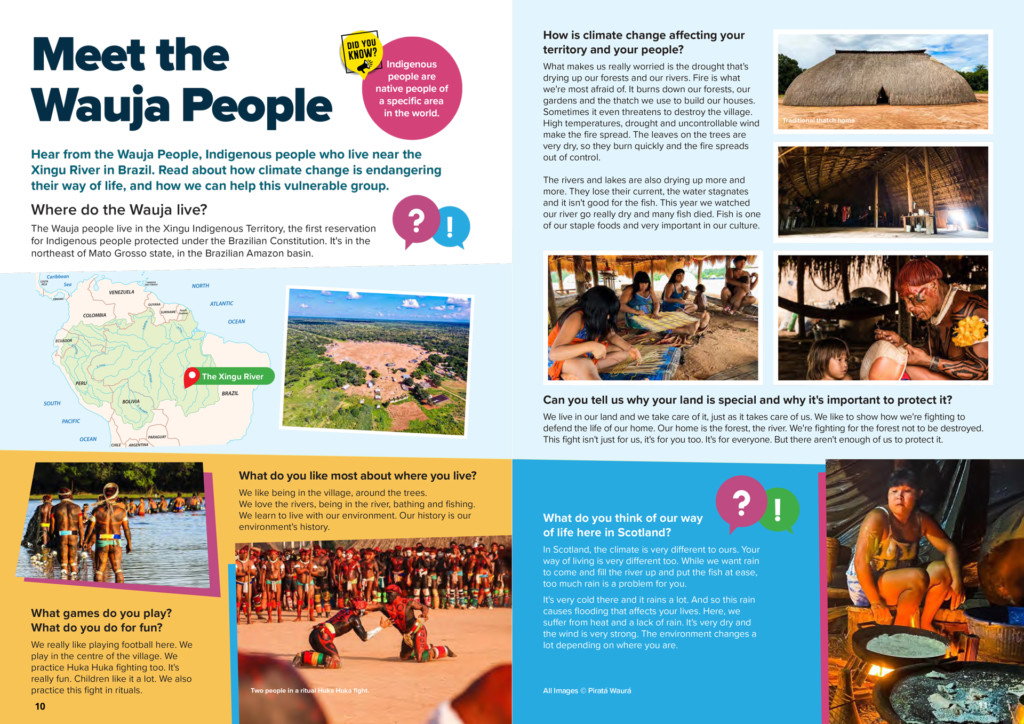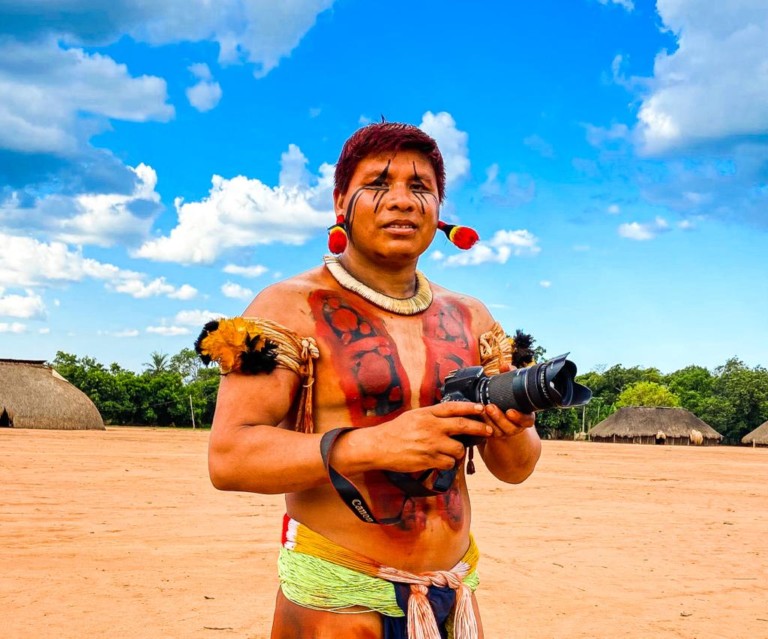“We need help. All of our territories and traditions are being affected by climate change and by ever-increasing deforestation.”
An interview with PPP’s partner and indigenous filmmaker Piratá Wauja by Glasgow Science Centre
At the end of 2021/following on from/during COP26, Glasgow Science Centre interviewed the Wauja People, an indigenous group who live in the Xingu Indigenous Territory, in the Brazilian Amazon Rainforest. It is the first reservation for indigenous people to be protected under the Brazilian Constitution.

What do you like most about where you live?
We like being in the village, around the trees. We love the rivers, being in the river, bathing and fishing. That’s why we like living here. We learn to live with our environment. Our history is our environment’s history. The river is our history. And we want it to be like this forever.
Why is your land special and why is it important to protect it?
We live in our land and we take care of it, just as it takes care of us. We like to show how we’re fighting to defend the life of our home. Our home is the forest, the river. We’re fighting for the forest not to be destroyed. This fight isn’t just for us, it’s for you too. It’s for everyone. But there aren’t enough of us to protect it. We plant and live with the forest. Without the forest, we are no longer people.
How is climate change affecting your territory and people?
Fire is what we’re most afraid of. It burns down our forests, our gardens and the thatch we use to build our houses. Sometimes it even threatens to destroy the village. High temperatures, drought and uncontrollable wind make the fire spread. The leaves on the trees are very dry, so they burn quickly and the fire spreads out of control. The rivers and lakes are also drying up more and more. They lose their current, the water stagnates and it isn’t good for the fish. This year we watched our river go really dry and many fish died. Fish is one of our staple foods and very important in our culture. Whenever there is a ritual, we offer fish to our guests. This year we didn’t have enough fish for our rituals and we had to offer our guests food from the city. Our cultural and planting calendar has changed because of the changes in the weather, and rain and drought patterns. It affects our crops, our cultural practices and our way of life.
What is deforestation and how is it affecting you and the animals in your region?
We are suffering a lot because of deforestation and the animals are suffering too. Our territory is a green territory, but everything around it has been destroyed and cut down by agribusiness. With the increase in deforestation around our territory, we noticed animals escaping it and entering indigenous territory to find food. Animals are suffering from the heat and the lack of food and are becoming more aggressive. Wild boars are attacking our crops and eating our manioc. Jaguars are stalking the villages, attacking our dogs and even attacking people!
What do you think of our way of life here in Scotland?
In Scotland, the climate is very different to ours. Your way of living is very different too. While we want rain to come and fill the river up and put the fish at ease, too much rain is a problem for you. It’s very cold there and it rains a lot. And so this rain causes flooding that affects your lives. Here, we suffer from heat and a lack of rain. It’s very dry and the wind is very strong. The environment changes a lot depending on where you are.
Do you have any advice for us, about how to look after our environment better?
The Wauja people always have advice for non-indigenous people about the importance of respecting nature! We are nature and we live in nature. We’d like to advise you to think of alternative production methods that don’t destroy the environment.
We, the Wauja, and other indigenous peoples protect the environment, we live in it, we take care of it, we don’t destroy it on a large scale. We plant to eat and not to sell. We plant to live.
Here, where we live, we’re engaged in a very fierce battle with agribusiness and deforestation. We can’t stop them. The government is encouraging deforestation. We want to say to the world and to European countries that we are struggling because of this. The pesticides that are used on agribusiness crops are sold by some countries in Europe. These products are banned in Europe because they’re toxic, but they’re used here. This poison affects us. It affects the land, rivers, forests and indigenous peoples. This agribusiness production is not for us. It doesn’t feed us. It’s for other countries. This is killing us. The countries of the world need to make a commitment to protect indigenous and traditional peoples, and stop financing deforestation and fuelling agribusiness, because this is harming the forest, indigenous peoples and human life.
I hope this message stirs people’s consciences to think about indigenous peoples. We are crying out for help. Help us protect our homes, trees, rivers, forests. They’re our parents, they give us life. We cannot kill life to earn money. This doesn’t fit with our beliefs. We’ve learned to live together and respect the forest. We want to teach you this.
What can we do to help?
We need help. All of our traditions are being affected by climate change and by ever-increasing deforestation. We can no longer carry out our practices like we did before. We’re trying to protect the forests, but these changes mean we can’t preserve them. We’re fighting to keep our forest intact, but we’re finding it really hard. We don’t know what to do.
The Wauja people keep trying to control the fire, but we need equipment and training to fight it. We need a volunteer indigenous fire brigade and, for that, we need equipment and training.
We’re also using audio-visual productions to show the world what is happening here. It’s a tool that can help us with this. We also need equipment to carry on with this work.
Technology is bringing us closer to you and helping us to show you how climate change is affecting our lives.
Learn more about our Indigenous Projects (Know key area)
